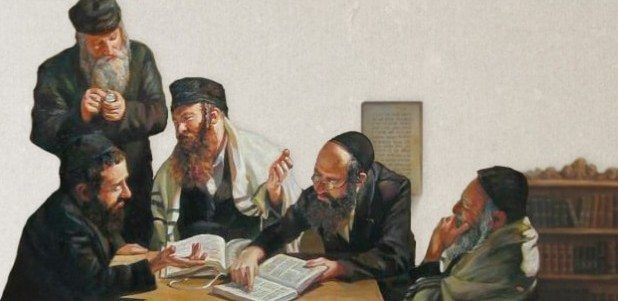 The first Biblical texts found on earth are now approximately 2700 years old. Over the span of these 2700 years, the world has become increasingly polarized on the debate between religion and science. However, regardless of religious inclinations, the Bible’s effect on the fabric of our modern society is undeniable. The Bible not only serves as a book for spiritual guidance for its followers, but it also serves as the basis of most of the constitutional laws of today’s seemingly secular countries such as the United States and the United Kingdom. Judeo-Christian rules from the Bible are deeply ingrained in most of the world’s developed countries, and it is thus imperative for anyone wishing to truly comprehend their society to develop a deeper understanding of the Bible.
The first Biblical texts found on earth are now approximately 2700 years old. Over the span of these 2700 years, the world has become increasingly polarized on the debate between religion and science. However, regardless of religious inclinations, the Bible’s effect on the fabric of our modern society is undeniable. The Bible not only serves as a book for spiritual guidance for its followers, but it also serves as the basis of most of the constitutional laws of today’s seemingly secular countries such as the United States and the United Kingdom. Judeo-Christian rules from the Bible are deeply ingrained in most of the world’s developed countries, and it is thus imperative for anyone wishing to truly comprehend their society to develop a deeper understanding of the Bible.
However, the original text of the Bible is in Hebrew, which is a lost language to people in most parts of the world. Still, there are people who want to learn Hebrew, the language of the Bible. When the knowledge of Hebrew is so scarce it should be no surprise that the general person’s understanding of the Bible is mostly based on published translations or hearsay that has been passed down the generations.
To counter this, the Israel Institute of Biblical Studies has introduced a complete series of courses for people who want to study Hebrew, learn the language and understand the Bible in its most authentic essence. It is high time that every individual has a chance to read and interpret the Bible by themselves.
 About Israel Institute of Biblical Studies
About Israel Institute of Biblical Studies
Israel Institute of Biblical Studies enjoys the stature of being one of the most respected institutes of biblical studies in Israel and across the world. They have a panel of experts who are individually experienced and knowledgeable in all domains of biblical education, including linguistics, history, and philosophy. These experts can craft courses and impart knowledge that helps people gain the upper hand in biblical studies.
Make Use of Your Interest in Hebrew: Learn the Language and Earn University Credits
Having partnered with the Hebrew University of Jerusalem, Israel Institute of Biblical Studies has further cemented the credibility and recognition of its courses. The Hebrew University of Jerusalem is one of the oldest and most accredited Biblical research institutions worldwide.
This partnership has brought a significant number of benefits for the institute and its students. They have managed to further curate and mend their courses in a modernized manner, which in turns has helped their students get an improved edge on Biblical Scriptures.
Additionally, one of the most noteworthy advantages gained by their students thanks to this collaboration is the accreditation by The Hebrew University of Jerusalem. This enables them to take the courses for credits which are accepted and recognized by universities around the world. The ability to attain college credit for Hebrew courses gives an edge to college students pursuing degrees in areas such as sociology, law, political science, and philosophy as most of these disciplines stem from the Bible.
They have been in the market for several years, which means that they are aware of how to deliver educational content online. Their collaboration with the Hebrew University of Jerusalem enables them to provide an educational experience that brings life to the study of Hebrew.
Online Courses Tailor-Made for 21st-Century Students
Students can learn Hebrew right from the comfort of their own homes. These courses are conducted through live streaming sessions, which enable students to shoot queries to the instructor on an as-it-occurs basis. This takes away the possibilities of any ambiguity and eventually contributes to a seamless learning experience for students.
In addition to interactions with the teacher during the live session, the Israel Institute of Biblical Studies also boasts a vast forum and community of individuals who are readily available for discussions. These forums help the students in developing their connections and growing a network of fellow Biblical enthusiasts and social scientists, eventually enabling them to advance their interest in learning the language of the Holy Bible.
Their courses are divided into five levels, each one varying in difficulty levels. Here are brief details of what they offer:
Introduction to Biblical Hebrew – Level A
This course in Biblical Hebrew is aimed at people who are just starting and have no knowledge of Hebrew. It starts from the absolute basics of the language and is primarily created to introduce people to the ancient language.
This is the foundation stone for the students who are wanting to go on to interpret the content of the Holy Bible to understand its message and apply it to other disciplines.
The course has been developed by Dr. Ohad Cohen, who was previously a linguistics researcher at the Hebrew University of Jerusalem and is now a faculty member of the Hebrew department of the University of Haifa.
The syllabus is divided into several categories. The first one is the Hebrew Alphabet, which aims to officially introduce the students to the first eight letters of the Hebrew language. The history of this alphabet, along with its relationship with the Latin one, is discussed in this.
The second category consists of the remainder of the alphabet left out in the first category, thus completing the 23 letters of the Hebrew language.
The third and fourth categories are about the vowels in Hebrew and their notations. The first vowel, A, is briefed upon in the third category, while the remaining four are discussed in the fourth category.
The fifth category is aimed at detailing the usage of gemination in Hebrew. A selected few verses from the story of the tree of knowledge will be discussed in this category as well.
The remaining categories aim to make the students further aware of Hebrew to prepare them for their future readings.
The course offers three credits at the Hebrew University of Jerusalem and requires up to 2 hours per week of the student’s time. Weekly 1-on-1 Q&A sessions are arranged with the instructor as well, to address student queries in a better manner.
 Further Biblical Hebrew – Level B
Further Biblical Hebrew – Level B
The main purpose of learning Biblical Hebrew is to be able to read the Bible. The Level B course consists of Bible reading, which is invariably aimed at getting them used to the Hebrew language.
The 9-month long course carries 3 University credits from the Hebrew University of Jerusalem and is the perfect tool for students to base their language skills on. This has been developed by Dr. Ohad as well.
The syllabus content starts from an in-depth analysis of the book of Jonah and goes on to discuss the birth of Moses, the usage of participles and imperatives in Hebrew as well as the verbal system of the language.
At the end of the course, a few verses of the Patriarch Isaac are read out without translation to assess where the students stand in terms of their learning. Special emphasis is placed on the verb forms and syllables used in the verses to revise what’s been learned until now. Further translation of the verses is done as well to cement the student’s linguistic abilities.
One step further – Level C
This is the intermediate level. By now, students are expected to be aware of the alphabet of Hebrew, the verbal structure, and have a basic idea of how to interpret the texts of the Bible. In this level, the student’s reading abilities are further developed by teaching them how to use dictionaries and other grammar tools while trying to interpret the Bible.
This 9-month long course requires students to take out 3 hours each week for their classes. The course, which is once again developed by Dr. Ohad, is worth three credits at the Hebrew University of Jerusalem.
The syllabus content starts out from the reading of 1 Samuel 16. The students are reminded about the usage of verbs in Hebrew in order to keep the content covered in the first two courses fresh in their minds. Further revision of the Hebrew number system is done during the reading too.
The course also entails discussion of Hebrew lexicons. Additionally, several new groups of verbs such as י” וע verbs and י” פ verbs are introduced while details of the David vs. Goliath battle are presented to the students.
At the end of the course, an assessment of the things learned up till now is conducted through a translation of a few verses from a Psalm of David. This is considered vital before the beginning of Course D as it formally introduces students to Hebrew literature in the form of poetry.
 Advanced Level Hebrew – Level D
Advanced Level Hebrew – Level D
This course is based on other forms of Hebrew literature, i.e., poetry such as the Book of Psalms and Isaiah’s Prophecy, etc. The course sets the perfect scene for students to discuss biblical poetry among themselves and enlightens them with wisdom literature such as Ecclesiastes.
The advanced level of the Hebrew language course runs over nine months, carries the same amount of credits as the other levels, and requires students to take out 2 hours each week.
The content starts off from the stories of Elijah. The narrative nature of the stories of Elijah is the perfect way of teaching students the various forms of Biblical literature. This is followed by an introduction to Biblical poetry, with a brief discussion on what Biblical poetry is and what its main features are.
Further on, students will be briefed about what parallelism is and how various parts of a verse can be parallel to one another. Then come the Psalms; the first Psalm will be read out by the students in order to put their skills to the test. The poetic structures used in the Psalm will be discussed during this, so the students are made aware of the usage of poetry throughout Biblical Literature.
A number of Prophecies such as the Prophetic Parable in Isaiah, and the Prophecies of Rebuke/Consolation will be studied so that the students’ knowledge base is further increased. Further on, students will be familiarized with a different genre of biblical literature, i.e., Wisdom literature. The Book of Proverbs will be examined in order to establish how wisdom literature has a few features of poetry but is not exactly poetic itself.
Only for Experts – Level E
At this stage, students are expected to know the inside out of Hebrew except for a few things. Students are taught the history of Biblical Hebrew and its evolution through several periods. Students are also acquainted with language registers and ancient literature e.g., the Dead Sea Scrolls.
The course is spread over a time period of 9 months, and students need to set out 2 hours each week in order to pursue and complete the syllabus content of the course. This course has been developed by Dr. Ohad as well.
Diachronic description of the Hebrew language differs from the synchronic description that’s been used up till now in the first four courses. Students will be made aware of the difference between the two and the significance of this difference along with its usage in the process of the interpretation of biblical Hebrew.
At first, the roots of Biblical Hebrew are taken out and dissected. Students are briefed about the consonant shifts in Hebrew, dating back to the Proto-Semitic times. The evolution of the original 29 Semitic consonants into Biblical Hebrew are discussed with students so that they’re made aware of how Hebrew was essentially curated.
Then comes Archaic poetry, which is considered the first stage of Biblical Hebrew. Students observe and analyze the use of Archaic poetry in the Song of the Sea. In the end, a comprehensive look is made at the syntax and words used in Archaic poetry before wrapping it up.
Thereafter, the historic “First Temple Period” is brought in front of the students and they’re made aware of the peculiarities of the period. Students are briefed upon how some of the verb forms used during the First Temple Period are similar to those used currently. E.g., Weqatal.
Then comes the “Second Temple Period.” During this, the Hebrew language inherited words from other languages such as Persian and Aramaic, with the latter playing a very significant part in the development of Hebrew.
The last and final stage to be discussed is the time of the Dead Sea Scrolls. The nature of Hebrew used in these scrolls turned out to be a huge stepping stone in how we interpret Hebrew texts now. The vocabulary used in these scrolls are said to be very similar to the Biblical Hebrew we know today, but not exactly the same. The differences can be observed to be from other sources of biblical literature.
In the end, a full and total review of what’s been learned up till now is undertaken. The characteristics of each of the stages of the development of Hebrew into what it is today are discussed, and the differences and similarities are highlighted.
Final Learning Outcomes:
The aforementioned courses under the umbrella of the Israel Institute of Biblical Studies serve as an all-encompassing guide for people at all levels of Hebrew knowledge to study Biblical Hebrew, learn the language as it relates to religious doctrines, and to use their knowledge of Hebrew to understand the Bible in a more nuanced way. These courses will help anyone seeking to unearth the truths of the Bible and assess how certain Biblical ideas are relevant to our world today.